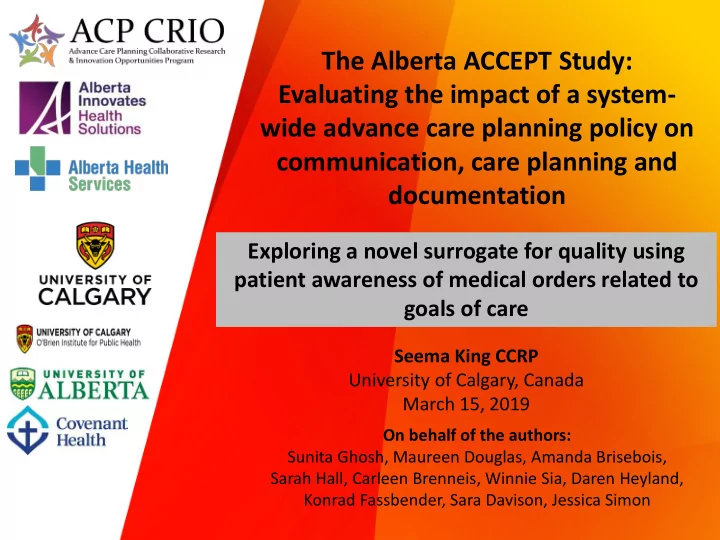

The Alberta ACCEPT Study: Evaluating the impact of a system- wide advance care planning policy on communication, care planning and documentation Exploring a novel surrogate for quality using patient awareness of medical orders related to goals of care Seema King CCRP University of Calgary, Canada March 15, 2019 On behalf of the authors: Sunita Ghosh, Maureen Douglas, Amanda Brisebois, Sarah Hall, Carleen Brenneis, Winnie Sia, Daren Heyland, Konrad Fassbender, Sara Davison, Jessica Simon
Disclosure of speaker’s interests (Potential) conflict of interest None/See below Potentially relevant company relationships in None connection with event 1 Research funding Alberta Innovates Health Solutions
Background Heyland DK, Barwich D, Pichora D, Dodek P, Lamontagne F, You JJ, Tayler C, Porterfield P, Sinuff T, Simon J JAMA Intern Med. 2013;173(9):778-787.
Alberta ACCEPT: Objective 3 years post provincial implementation of ACP policy: What is the level of patient engagement, their experiences and outcomes? Prospective cohort patient survey and chart audit of older and chronically ill hospitalized adults
Study Components 1. Patient Experience Survey — Demographics — ACP prior to hospitalization Completed 2-5 days after admission on — Goals of Care conversations in hospital day of consent — GCD order awareness — Current GCD order preference 2. Admission Chart Audit ------------------------------------------------ Review of hospital 3. Discharge Chart Audit stay until discharge, death or 3 months
Primary question Other verbal prompts given: - “RMC Form” - “GCD” - Resuscitative Care, Medical Care, Comfort Care
Recruitment Total: 502 Participants A l b e r t a • 55 years or older with one or more of the following diagnosis: • Chronic obstructive pulmonary disease • Congestive heart failure • Cirrhosis • Cancer Edmonton Renal Failure • • 80 years of age or older admitted from Calgary community with acute medical or surgical condition • 55 to 79 years of age that meet the surprise Lethbridge question
Demographics Health Literacy: Never need help 48% Marital status: 57% High School 42% widowed, 41% married diploma or less Mean age: 81 years 53% female 80% Caucasian, English speaking 74% living at home, Self health rating: 57% have no home care 53/100 Frailty: Vulnerable (25%), Mild (21%), Moderate (20%)
RESULTS: Primary outcome 93% Do you have a Goals of Care Designation order? 39% 31% 30% Yes No Unsure Have GCD Order
RESULTS: Secondary Outcomes Have you: Before Hospitalization 1. Heard about ACP (55%) 2. Thought about medical interventions you would want (77%) 3. Made EOL decisions for someone (66%) 4. Talked to family/friends (83%) 5. Talked to a HCP (73%) 6. Written down your wishes (54%) 7. Named an SDM (64%) During Hospitalization Has a HCP asked you: 1. What was important to you (16%) 2. Talked to you about your prognosis (19%) 3. About your fears or concerns (23%) 4. Treatment preferences (34%) 5. If you had prior discussions or written documents about ACP (19%) None of the above (33%) More ACP conversations happening prior to, than during early hospitalization. 67% of patients rate these conversations to be very important or important to them 82% of patients are very satisfied or satisfied with these conversations when they happen
RESULTS: Primary Outcome (Multivariate analysis) 95% C.I.for EXP(B) B S.E. Wald df Sig. Exp(B) Lower Upper Center 21.246 2 .000 Mild/Moderate Frailty 1.170 .597 3.843 1 .050 3.221 1.000 10.372 No discussion of key elements in hospital .831 .332 6.273 1 .012 2.297 1.198 4.402 HCP asked if prior ACP convo/documents in hospital -.592 .290 4.178 1 .041 .553 .314 .976 Patients thought discussion was important -.739 .272 7.387 1 .007 .478 .280 .814 Gender -.198 .231 .736 1 .391 .820 .521 1.290 Talked to HCP before hospital -.092 .314 .086 1 .769 .912 .493 1.687 Frailty 6.709 3 .082 Well/Fit .668 .671 .991 1 .319 1.950 .524 7.260 Vulnerable/Managing well .698 .603 1.343 1 .247 2.010 .617 6.549 Heard about ACP before hospital -.096 .231 .172 1 .679 .909 .578 1.429 Made EOL decisions for someone else -.119 .233 .259 1 .611 .888 .562 1.403 Thought about treatment preferences before hospital .604 .348 3.008 1 .083 1.830 .924 3.623 Talked with family/friend before hospital -.444 .438 1.027 1 .311 .641 .272 1.514 Written down wishes .336 .316 1.134 1 .287 1.400 .754 2.599 Named an SDM -.174 .338 .266 1 .606 .840 .433 1.629 Have a Personal Directive -.396 .366 1.174 1 .279 .673 .329 1.378 HCP discussed fears and concerns .076 .274 .078 1 .780 1.079 .631 1.847 HCP discussed treatment preferences in hospital .333 .267 1.552 1 .213 1.395 .826 2.354 Had a Green Sleeve in chart .097 .289 .113 1 .736 1.102 .626 1.942
Conclusion There are moderate levels of prior ACP engagement in AB Patients experience lower levels of communication in hospital, and this seems to be associated with poor awareness of their GCD order. We are using this information to inform quality improvement projects related to conversations in hospital
Thank you! Questions/comments? Seema King seema.king@ucalgary.ca www.acpcrio.org
Recommend
More recommend